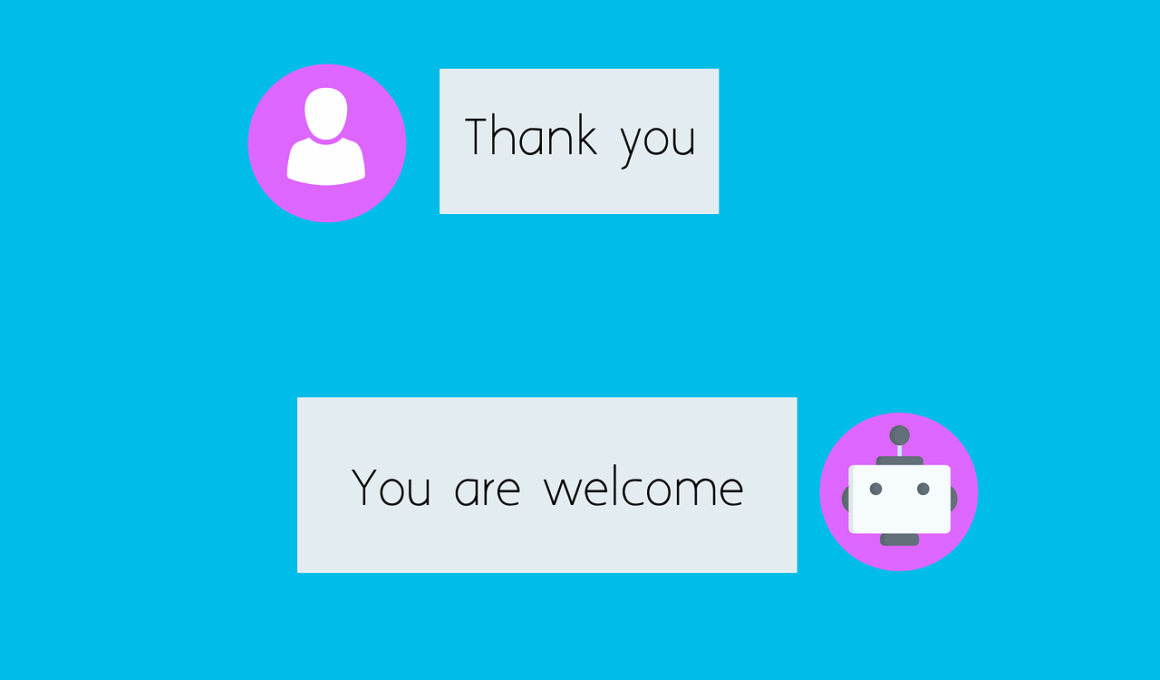Chatbots and Their Impact on Customer Engagement and Retention
In the rapidly evolving world of customer service, chatbots have emerged as pivotal tools for fostering customer engagement and retention. With the advent of Artificial Intelligence (AI), chatbots can now understand and respond to customer inquiries in real-time. Their primary function is to provide quick and efficient answers to common questions, which significantly enhances user experiences. By automating customer interactions, businesses can manage high volumes of inquiries without compromising quality. This capability not only frees up human agents for more complex issues but also ensures that customers receive immediate assistance. Moreover, chatbots can operate 24/7, offering continuous support and convenience for users across various time zones. As a result, companies can cater to the diverse needs of their clientele, ultimately improving customer satisfaction. Enhanced engagement leads to reduced churn rates, as customers feel valued when their queries are quickly addressed. Additionally, with access to vast amounts of data, AI chatbots can continuously learn and improve their responses. This ongoing development makes them invaluable resources for companies aiming to strengthen customer loyalty and maintain competitive advantage.
Another significant impact of chatbots on customer retention is their ability to personalize customer interactions. AI-driven chatbots analyze user data, browsing behavior, and purchasing history to provide tailored recommendations and advice. This personal touch creates a more engaging interaction as customers receive content, products, or services suited to their specific needs. Such customization not only enhances the customer experience but also strengthens brand loyalty. Customers are more likely to return to businesses that understand their preferences and cater to them effectively. Chatbots can also facilitate follow-up communications, sending reminders and offers based on past purchases. This level of proactive customer engagement further solidifies the relationship between the brand and its customers. It ensures customers feel appreciated while also encouraging repeat purchases. Additionally, chatbots can initiate satisfaction surveys, allowing businesses to gauge customer sentiment continuously. By actively seeking feedback, companies can adapt their strategies and offerings, showing customers that their opinions are valued. This responsiveness fosters a sense of community, encouraging customers to stay loyal and spread positive word-of-mouth about the brand.
The Cost-Effectiveness of Chatbots in Customer Service
Implementing chatbots can significantly reduce operational costs for businesses. Traditional customer service models often involve hiring large teams for support, which can be expensive and time-consuming. Chatbots, powered by AI, can handle a multitude of inquiries simultaneously, eliminating the need for extensive human resources. Consequently, businesses can allocate their budgets more effectively, investing in other areas like product development or marketing. Moreover, the return on investment (ROI) for chatbot implementations can be impressive. While the initial setup may require funding, the long-term savings and efficiency gained often far outweigh these costs. Additionally, chatbots can provide insights into customer behavior, helping businesses identify trends and develop strategies that drive engagement. By utilizing data collected through chatbot interactions, companies can tailor their marketing efforts, creating campaigns that resonate with their audience. Engaging with customers through chatbots also leads to higher conversion rates, as customers who receive timely and relevant information are more likely to make purchases. Thus, the cost-effectiveness of chatbots not only aids in customer engagement but also contributes to increased profitability.
Besides improving efficiency and cost-effectiveness, chatbots significantly elevate the overall customer experience. Their capacity to provide instant responses ensures that customers do not experience long waiting times typical in traditional customer service. This speed not only aids in resolving queries but also creates a positive impression of the company. A satisfied customer is more likely to stay loyal, as their needs are met promptly. Furthermore, chatbots can engage customers on multiple channels, such as websites, social media, and messaging platforms. This omnichannel approach enables customers to interact with the brand in their preferred environment, enhancing engagement. Chatbots can seamlessly transition between different platforms while maintaining context, providing a fluid customer journey. As a result, customers can receive consistent support, regardless of the medium. Additionally, through engaging and friendly dialogues, chatbots foster a sense of relationship with customers. This emotional connection can be crucial in fostering loyalty, as consumers increasingly seek brands that resonate with their values and preferences. Overall, enhancing the customer experience through chatbots plays a vital role in retaining customers that contribute to business success.
Enhancing Customer Feedback Mechanisms
Chatbots can also play a crucial role in collecting valuable customer feedback. Traditionally, gathering feedback could be a daunting task, requiring structured surveys and follow-up calls. However, chatbots simplify this process by initiating conversations designed to solicit customer opinions. After an interaction, a chatbot can ask users how satisfied they were with the service or product. This direct approach increases the likelihood of receiving feedback as customers are often more willing to respond to a quick question. By analyzing this data, businesses can identify pain points and areas for improvement. Enhanced feedback mechanisms also convey to customers that their opinions were acknowledged and appreciated. Such recognition can lead to deeper loyalty as customers feel that they are part of the process in shaping the business. Moreover, the feedback collected through chatbots can help companies to refine their service offerings, creating a continuous improvement cycle. This instills a culture of responsiveness, essential in retaining customers in a competitive market. Overall, harnessing chatbots for feedback is a strategic approach to bolstering customer engagement and retention.
As customers increasingly favor self-service options, chatbots align perfectly with this trend. Today’s consumers appreciate the autonomy of addressing their issues without waiting in long queues or being placed on hold. Chatbots empower users to find solutions to their problems quickly and efficiently. This self-service model also reduces frustration and enhances overall satisfaction as customers can navigate issues at their own pace. Additionally, chatbots can serve as educational tools, guiding customers through complex processes or offering tutorials on products. By providing quick access to information, chatbots empower customers to make informed decisions, further reinforcing their likelihood of returning. This accessibility to resources ensures that customers are more engaged with the brand since they have the tools necessary for their inquiries. Furthermore, the ease of use demonstrated by chatbots can foster a sense of trust in the brand. When customers feel confident in their ability to resolve issues, their loyalty is often strengthened. Ultimately, chatbots serve as valuable assets in addressing the evolving needs and preferences of modern consumers while ensuring sustained engagement.
Future Prospects of AI-Driven Customer Engagement
Looking ahead, the potential applications of AI in customer retention through chatbots are vast and promising. As technology advances, chatbots will likely evolve to become even more intuitive and responsive to customer needs. Enhanced capabilities will allow them to employ natural language processing (NLP), enabling seamless conversations that feel more human-like. The future will also see the integration of emotions and sentiment analysis, empowering chatbots to tailor their responses based on the customer’s emotional state. This level of sophistication can significantly impact how brands engage with their customers, allowing for empathetic interactions. Moreover, advancements in machine learning will enable chatbots to predict customer behaviors, enhancing their ability to provide proactive recommendations. By anticipating customer needs, businesses can foster stronger relationships with their clients. Additionally, as the integration of chatbots becomes commonplace, customers will increasingly expect sophisticated AI interactions. This development puts pressure on businesses to continually innovate in their customer engagement strategies. The future envisions chatbots not merely as tools but as integral components of the entire customer experience ecosystem, driving engagement and retention to new heights.
In conclusion, the use of chatbots in customer engagement and retention strategies is a game-changer. Their ability to automate responses, personalize interactions, and gather feedback enhances customer experiences and drives loyalty. As brands continue to embrace chatbots, they will need to adapt to emerging technologies and consumer preferences. Companies that invest in innovative AI solutions will likely gain a competitive advantage and foster deeper emotional connections with their customers. It is essential for businesses to ensure that their chatbot implementations align with their overall service goals and company values. This alignment will guarantee that the chatbot reflects the brand’s identity and ethos, enhancing customer interactions. Ultimately, as customer expectations evolve, chatbots must also adapt to meet these demands. By continuously refining their strategies and leveraging AI capabilities, businesses can strengthen their customer retention efforts. Successfully engaging consumers through chatbots will result in increased brand loyalty and improved customer satisfaction over time. Therefore, integrating AI-driven chatbots into customer retention strategies is not just an option but a necessity for businesses aiming for long-term success.


